Les films ayant pour origine le pays "inde", triés par recette

Saaransh (1984)
, 2h17Réalisé par Mahesh Bhatt
Origine Inde
Genres Drame
Acteurs Anupam Kher, Rohini Hattangadi, Alok Nath, Soni Razdan, Nilu Phule, Akash Chandra Khurana
Dans le quartier de Shivaji, à Mumbai, le couple Pradhan est confronté à la mort de leur fils, victime d'un braquage dans la ville de New York.

La Maison et le Monde (1985)
, 2h20Réalisé par Satyajit Ray
Origine Inde
Genres Drame
Acteurs Victor Banerjee, Jennifer Kendal, Soumitra Chatterjee, Swatilekha Sengupta, Manoj Mitra
En 1905, la société indienne est en crise. Le gouverneur général des Indes, s'appuyant sur l'antagonisme entre Hindous et Musulmans, divise le Bengale en deux, afin de mieux pouvoir perturber l'économie locale et importer des produits anglais.

Hero (1983)
, 2h53Réalisé par Subhash Ghai
Origine Inde
Genres Action, Romance
Acteurs Jackie Shroff, Meenakshi Seshadri, Sanjeev Kumar, Subhash Ghai, Shammi Kapoor, Amrish Puri
The story starts off with Pasha (Amrish Puri) being taken to prison. To get out of the situation, he writes to his best man, Jackie (Jackie Shroff). Jackie goes to Shrikanth Mathur (Shammi Kapoor) and warns him. He then kidnaps Shrikanth's daughter Radha (Meenakshi Sheshadri). He tells her that he is a police officer and they fall in love; however, she finds out that he is a goon. Nevertheless, she does not leave him but urges him to surrender. Transformed by true love, Jackie surrenders himself to the police and is imprisoned for two years.

Affaire Classée (1982)
, 1h35Réalisé par Mrinal Sen
Origine Inde
Genres Drame
Acteurs Anjan Dutt, Mamata Shankar
Palan, un adolescent pauvre de la campagne, est "loué" comme serviteur par un jeune couple de la moyenne bourgeoisie citadine, Anjan et sa femme Mamata. En échange de certaines tâches ménagères à accomplir, Palan peut manger les restes et dormir sous l'escalier exposé au vent. Mais, une nuit il fait trop froid, et l'adolescent remonte à l'appartement pour dormir près de la cuisinière à charbon. Au matin, il est découvert mort, sans doute asphyxié par le monoxyde de carbone. L'enquête de la police, la curiosité des voisins, l'arrivée du père du jeune garçon plonge la famille d'Anjan dans un véritable cauchemar...
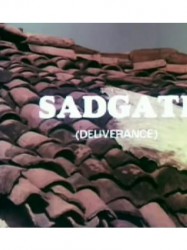
Délivrance (1981)
, 45minutesRéalisé par Satyajit Ray
Origine Inde
Genres Drame
Acteurs Om Puri, Smita Patil, Mohan Agashe, Gita Siddharth
Dukhi (joué par Om Puri), tanneur intouchable d'un village du Rajasthan, a besoin des services du prêtre brahmane (joué par Mohan Agashe) pour fixer la date du mariage de sa fille. Il se rend donc chez lui, et le brahmane, qui n'a pas le temps de venir, lui confie toute une série de travaux à accomplir. Bien qu'il se remette à peine d'une mauvaise fièvre, Dukhi s'exécute.
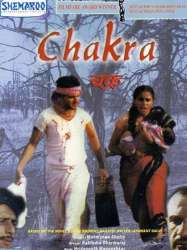
Chakra (1981)
, 2h20Origine Inde
Genres Action
Acteurs Smita Patil, Naseeruddin Shah, Kulbhushan Kharbanda, Rohini Hattangadi, Salim Ghouse, Anjali Paigankar
Amma (Smita Patil) and her son Benwa (Ranjit Chowdhry) become Bombay’s slum-dwellers after running away from their village, after her husband kills a moneylender who tried to rape her. The husband is then shot trying to steal some tin to build a hut.
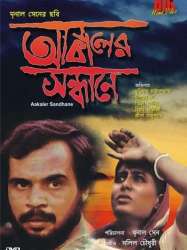
À la recherche de la famine (1981)
, 1h55Réalisé par Mrinal Sen
Origine Inde
Genres Drame
Thèmes Film catastrophe
Acteurs Dhritiman Chatterjee, Smita Patil, Rajen Tarafdar, Deepankar De, Biplab Chatterjee
In September 1980, a film crew comes to a village to make a film about a famine, which killed five million Bengalees in 1943. It was a man made famine, a side-product of the war, and the film crew will create the tragedy of those millions who died of starvation. The film documents the convivial life among the film crew and the hazards, problems and tension of film making on location. The actors live a double life, and the villagers, both simple and not-so-simple folk watch their work with wonder and suspicion. But as the film progresses, the recreated past begins to confront the present. The uneasy coexistence of 1943 and 1980 reveals bizarre connection, involving a village woman whose visions add a further dimension of time—that of future.

Le Dieu éléphant (1979)
, 1h52Réalisé par Satyajit Ray
Origine Inde
Genres Aventure, Policier
Acteurs Soumitra Chatterjee, Santosh Dutta, Utpal Dutt, Haradhan Bandopadhyay, Siddartha Chatterjee, Biplab Chatterjee
Le détective Feluda, accompagné de son jeune assistant Topshe et de son ami l'auteur de romans policiers Jatayu, est chargé de retrouver une petite statue du dieu Ganesh, de grande valeur, qui a disparu à Bénarès. Feluda se met en quête de la statue. Ses soupçons se portent rapidement sur un dangereux gangster bien connu dans la ville, tandis que la fête de Durga se prépare et qu'un mystérieux faiseur de miracles, qui se fait appeler l'Homme-Poisson, attire les foules.

Debdas (1979)
, 2h33Origine Inde
Genres Drame, Romance
Thèmes Alcoolisme, Maladie, Psychotrope, Sexualité, Erotique, Prostitution
Acteurs Soumitra Chatterjee, Supriya Choudhury, Uttam Kumar, Bhanu Bandyopadhyay, Kali Banerjee, Gita Dey
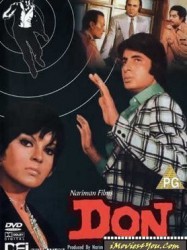
Don (1978)
, 2h55Réalisé par Chandra Barot
Origine Inde
Genres Thriller, Comédie, Action, Aventure, Policier
Thèmes La musique, Musique, Bollywood
Acteurs Amitabh Bachchan, Zeenat Aman, Pran Krishan Sikand, Helen Khan, Iftekhar, Om Shivpuri
Don, chef d'un gang international, est traqué puis tué par un officier de police, le commissaire D'Silva. Celui-ci décide de ne révéler à personne la mort de Don. Lorsqu'il rencontre Vijay, parfait sosie de Don, il lui propose un marché. Vijay se fera passer pour Don et infiltrera le gang. En retour, D'Silva apportera à Vijay l'aide matérielle qui lui permettra d'élever les deux enfants qu'il a recueillis. Vijay accepte et parvient à berner les complices de Don. Malheureusement, D'Silva meurt. Vijay se retrouve alors seul, traqué à la fois par la police et par les complices de Don qui ont fini par s'apercevoir de la substitution.

Les Joueurs d'échecs (1977)
, 2h9Réalisé par Satyajit Ray
Origine Inde
Genres Drame
Thèmes Jeu, Sport, Jeu d'échecs
Acteurs Shabana Azmi, Farida Jalal, Richard Attenborough, Amitabh Bachchan, Sanjeev Kumar, Amjad Khan
Le film montre en parallèle le drame historique du royaume indien d'Oudh (dont la capitale est Lucknow) et de son roi musulman Nawab Wajid Ali Shah, capturé par les Anglais, et l'histoire de deux notables obsédés par les échecs. Nawab, artiste et poète, monarque dépossédé, ne peut plus que se lamenter sur un mode poétique, une fois que les Anglais lui ont fait signer un traité de protection. Le général James Outram, qui intrigue pour faire tomber le roi, est conseillé par le capitaine Weston, tellement anglais dans ses manières mais tombé amoureux de la poésie ourdou.
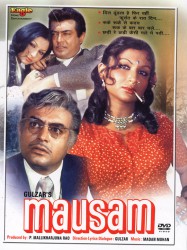
Mausam (1975)
, 2h36Réalisé par Gulzar
Origine Inde
Genres Drame, Romance
Thèmes Sexualité, Erotique, Prostitution
Acteurs Sharmila Tagore, Sanjeev Kumar, Dina Pathak, Om Shivpuri, Satyen Kappu, Agha
Mausam is a dramatic love story of Dr. Amarnath Gill, who falls for Chanda, the daughter of a local healer, Harihar Thapa, when visiting Darjeeling for his medical exams. Amarnath is called back and promises Chanda to return, though he never keeps his promise. Twenty-five years later, he returns as a wealthy man and searches for Chanda and her father. He learns that Harihar has died and that Chanda was married to a crippled old man. She gave birth to a daughter, became insane and died. Finding Chanda's daughter, Kajli, he sees that she closely resembles her mother and later discovers that after having been molested by her mother's brother-in-law, she ended up at a brothel. Amarnath had no choice but to buy her from the brothel and he takes Kajli home and tries to change her into well refined woman to make up for what he did to Chanda. Unaware that Amarnath is indirectly responsible for her mother's death, Kajli begins to fall in love for him.

Duvidha (Le Dilemme) (1973)
, 1h22Réalisé par Mani Kaul
Origine Inde
Genres Drame, Fantasy, Romance
Thèmes Fantômes
Acteurs Ravi Menon, Raisa Padamsee
Inspiré d’un conte populaire du Rajasthan, Duvidha est l’histoire du fils d’un marchand qui revient chez lui avec sa nouvelle épouse, avant d’être renvoyé s’occuper du commerce familial. Un fantôme tombe amoureux de la jeune femme, prenant l’apparence de son mari absent, et vit avec elle. Celle-ci met au monde un enfant.

Dhund (1973)
, 2h10Réalisé par Baldev Raj Chopra
Origine Inde
Genres Drame, Thriller, Romance
Thèmes La musique, Théâtre, Musique, Adaptation d'une pièce de théâtre, Bollywood
Acteurs Sanjay Khan, Navin Nischol, Zeenat Aman, Danny Denzongpa, Ashok Kumar, Madan Puri
On a foggy night, Chandrashekhar (Navin Nischol), who is driving his car at high speed, meets with an accident. He walks to a nearby house to ask for assistance. When nobody answers the door, he enters the house and finds the dead body of a wheelchair-bound man. Standing nearby is a beautiful, young woman, Rani (Zeenat Aman), with a gun. She tells him that the dead man is her husband and she has murdered him. She asks Chandrashekhar to call the police. Intrigued, Chandrashekhar asks Rani to tell her what happened. She tells him that her husband, Thakur Ranjit Singh (Danny Denzongpa), was a cruel man who used to mistreat his family and used to shoot cats and dogs with his gun for amusement (which is why nobody in the house woke up upon hearing the gunshot). On this night, before Chandrashekhar arrived, they had an argument and when her husband threatened to shoot her, she tried to take the gun away from him. In the ensuing struggle, Ranjit got shot.

Tonnerres lointains (1973)
, 1h41Réalisé par Satyajit Ray
Origine Inde
Genres Drame
Thèmes Politique, Film catastrophe
Acteurs Soumitra Chatterjee, Babita, Bobita, Sandhya Roy
Le film se déroule durant la Seconde Guerre mondiale, au Bengale, au début de la grande famine de 1943.
 Connexion
Connexion